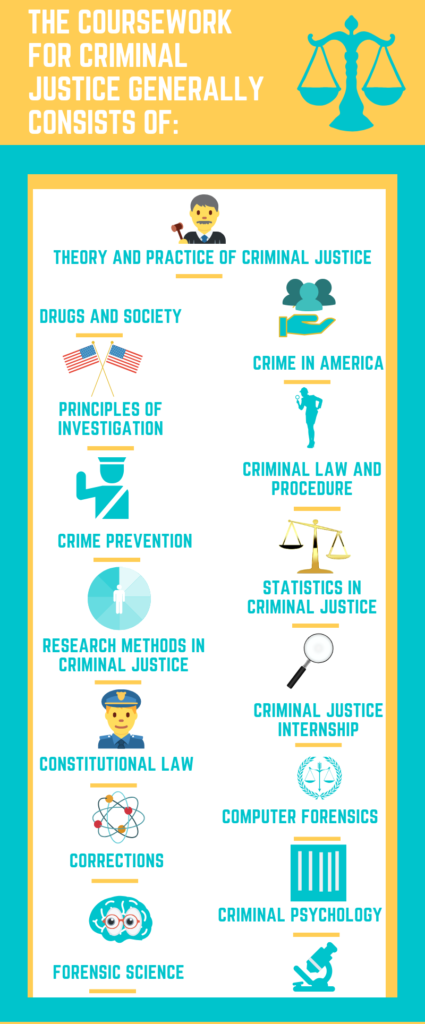The Ultimate Criminal Justice Career Guide

Find your perfect college degree
In this article, we will be covering...
Every country has a system that controls crime and imposes penalties on those who violate the laws of the land. In the U.S., it is known as the Criminal Justice system. It is a set of legal and social institutions for enforcing criminal law according to a defined set of procedural rules and limitations.
This system is often divided into separate entities: the federal, state, and military Criminal Justice systems. There are also different systems that govern the crimes of adults and juveniles.
Within the Criminal Justice system, one will find significant subsystems consisting of one or more public institutions and their workforce, from police and law enforcement agencies, trial and appellate courts, and the prosecution and public defender offices to probation and parole agencies, custodial institutions, and the department of corrections. Each jurisdiction has its own set of sentencing guidelines commission.
Those who want to be a part of the Criminal Justice system can build their career by studying Criminal Justice. Often used interchangeably with criminal law and criminology, Criminal Justice refers to the interdisciplinary study of the police, criminal courts, correctional institutions, and juvenile justice agencies.
Students who are interested in working in this field will be glad to know that the outlook for criminal justice employment is good. It also compensates well. A probation officer, for example, can earn as much as $59,860 annually.
Criminal Justice as a Degree

An exciting field with many sub-fields, a Criminal Justice degree is the best choice for those applying for the most sought-after jobs in the Criminal Justice system, from criminal investigator to law enforcement officer.
The focus of your Criminal Justice degree depends on the type of career you want to pursue after college. Some courses tackle the Criminal Justice system itself, technology in forensics, the corrections system, the court and its relation to law enforcement, and Criminal Justice theories.
Criminal Justice students complete courses in Statistics, Psychology, and Criminology. Most programs let students choose their areas of interest.
It can be in paralegal studies; others aim to master forensic science. A Criminal Justice degree is also a good foundation for those who want to become a police officer and climb the ladder leading to positions like that of a detective.
Undergraduate and post-graduate degrees are offered to Criminal Justice students. Generally, the program curriculum focuses on preparing students to understand the ins and outs of the system and the institutions involved. Courses emphasize ethical concerns, in addition to social and behavioral influences on crime and delinquency.
Students are expected to choose their preferred electives, which can build their career track specializations in different areas of this exciting career, including corrections, juvenile justice, law enforcement, legal studies, international justice, or management and administration.
Some schools encourage practical experience. Hence, they offer internship programs that place students in roles that involve navigating the justice system.
Some of the coursework that students can expect to learn in the Criminal Justice programs include:
- Theory and Practice of Criminal Justice
- Drugs and Society
- Crime in America
- Principles of Investigation
- Criminal Law and Procedure
- Crime Prevention
- Statistics in Criminal Justice
- Research Methods in Criminal Justice
- Criminal Justice Internship
- Constitutional Law
- Computer Forensics
- Corrections
- Criminal/Forensic Psychology
- Forensic Science
Students who want to take up a degree program in Criminal Justice are usually asked to submit their application form and other necessary documentation requirements to the university or college of their choice. Some are required to undergo placement testing before they can be admitted.
It helps if aspiring students have an interest in the aspects of the law, the psychology behind criminal behavior, and the law enforcement agencies that operate. This degree requires you to learn all of that and more, after all.
This career field doesn’t just limit you to police work; however, the field includes forensic science and psychology, paralegal work, counter-terrorism, cyber-crime prevention, and information security.
Types of Criminal Justice Degrees
The field of Criminal Justice is becoming competitive. Qualified applicants take advantage of the growing industry. Many organizations and agencies prefer applicants with a college degree for many key positions.
Having a degree in Criminal Justice is a definite advantage in this day and age, opening up a wealth of employment opportunities. There are several types of degrees, and each has different benefits. Here are the different levels that you can choose from:
Most positions in the law enforcement field require minimum educational attainment. Usually, a high school diploma can suffice. However, times are changing. More and more agencies are now seeking applicants with an associate degree, at the very least.
With an associate’s degree, students will be able to learn all about the fundamentals of law enforcement, court systems, corrections, theories of crime causation, and crime control policies. All of these can help them acquire fundamental knowledge of the Criminal Justice system and help navigate the complexities of law enforcement.
Associate’s Degree
This is where they learn terms and examine relevant courses like the role of law enforcement, Criminal Justice policies, U.S. court and correctional systems, and forensic science fundamentals.
Bachelor’s Degree
The bachelor’s degree level, on the other hand, can be the best ticket to many different positions, like those in law enforcement and private investigations. They can also work as probation officers, FBI agents, and as members of judicial courts.
Just like an associate degree, a bachelor’s degree program covers the basics of Criminal Justice, although with a more in-depth approach.
Students can choose their specializations, such as law enforcement, legal systems, or corrections. They are also encouraged to acquire practical experience through internship programs.
Some of the topics they will cover include:
- The justice system for minors
- Courtroom procedures
- Criminal parole and probation
- Relationship between law enforcement, judiciary, and corrections
- Social and Criminal Justice
- Application of social justice principles
Master’s Degree
If you want to explore the depths of this field more and develop expertise in a particular field, it is ideal to earn a master’s degree. This degree level considers an associate’s or bachelor’s degree as prerequisites.
Most graduates with a master’s degree in Criminal Justice go on to become officers in court or instructors in the field. Others choose the path of social work.
In this program, students focus on developing their research skills and theoretical knowledge. They look at illegal behavior more thoroughly, examining the factors that can influence it mentally, physically, and socially.
Students can expect to cover the following topics in this program: philosophical and historical foundations of justice, applied statistics in Criminal Justice, Criminal Justice analysis, forensic identification and profiling techniques, data analysis in criminology, and a survey of criminology theories.
Doctorate Degree
Just like any other doctoral program, a doctorate in Criminal Justice is most suitable for those who want to teach university-level courses. It is, understandably, more intense and concentrated than a master’s degree program. Students deal with comprehensive exams and complete a dissertation.
Some of the most common subjects for doctorate programs are criminal psychology, diplomatic relations, homeland security, and many others.
Criminal Justice Specializations

Individuals and agencies work together to fulfill their function in the Criminal Justice system.
There is a wide range of specializations within the field, from the police and other members of the law enforcement organizations to the court system, caseworkers, and corrections officers.
Those who are interested in building their criminal justice system must examine their options. What stage of the system is most suitable for you? What is your interest in the Criminal Justice system?
If you want to follow a career that deals with investigating and prosecuting crimes, a specialization in that particular field can set you straight to your chosen path.
Having a specialization can help you develop the required and relevant skills needed for a specific position. This will tailor your courses to your goals.
Corrections
To gain a better understanding of case management, the complex dynamics of addiction, and offender treatment, a specialization in the corrections field can help students. This is where they learn all about the goals and philosophies essential in correctional interventions.
It also helps them come up with sound decisions when it comes to criminal sentencing and penal sanctions.
Forensic Science
Crime scene investigation allows students to explore the sciences behind law enforcement practice and crime-scene investigations. This specialization, known as Forensic Science, focuses on defining the cause and manner of a person’s death.
A forensic scientist may also be tasked to notify the victim’s next of kin, interview witnesses, and interpret crime scene photography.
Homeland Security and Crisis Management
In this specialization, students will be able to work on developing a solid foundation in Criminal Justice that can help them dig deeper into crisis management, ethical issues, critical infrastructures, terrorism, and homeland security.
They will learn the specific techniques for protecting critical infrastructures, intelligence gathering, and technologies that are essential in preserving the protection of the homeland.
This course aims to arm them with foundational knowledge across a range of disciplines, from risk analysis, emergency plans, and strategic communications to national security and public policies that govern homeland security and risk management.
Law Enforcement
The rewarding field of law enforcement allows students to explore the relationship between the police force and the communities they are serving.
This specialization tackles the fundamentals of criminal justice, from police ethics and public policy to developing programs that empower communities to reduce crime. Students who specialize in this program will be able to create knowledge in police theory, law enforcement practice, and organization management.
Aside from positions in law enforcement, corrections, and other public fields, your Criminal Justice degree can also give you opportunities in social work and forensics.
Online vs. Brick and Mortar Criminal Justice Degrees

Since the field of Criminal Justice is continuously growing, universities have been offering the program to allow students to build their chosen careers.
Whether you want to enter the police academy or become a private investigator, a Criminal Justice degree is a good investment.
With the emergence of technology, it becomes even easier to acquire an associate’s, bachelor’s, or master’s degree in Criminal Justice. Students also have the option to earn it online.
But which is better, online or brick-and-mortar Criminal Justice degree?
Those who want discipline and interactive learning can go for a traditional criminal justice degree. This method of learning lets them interact with their classmates and develop teamwork. Many of the on-campus Criminal Justice programs are accredited.
Some of the most acclaimed schools offering a degree in Criminal Justice include Rutgers University in Newark with a B.S. in Criminal Justice. There are also the University of Iowa, West Virginia University, and George Mason University.
Those who are already working might find it hard to juggle their school and career. Fortunately, online degree programs are available for working adults who want to explore the field of Criminal Justice or further their education for better chances at promotions.
Online degree programs are flexible and do not necessarily require their presence on campus all the time. They can earn a degree at their own pace, too. Some of the notable online schools offering Criminal Justice degree programs are Arizona State University, University of Louisville, and Ball State University.
Financing Your Criminal Justice Education
Federal student loans, which include direct subsidized and unsubsidized loans, provide lower interest rates than private loans. Some loan plans are exclusive to criminal justice students and graduates, such as the NDSL/Perkins Loan Cancellation program, which allows up to 100% loan cancellation for full-time law enforcement or corrections officers.
Criminal justice students are offered scholarships and grants from schools, private companies, and the government. An example is the COAG (Constitutional Officers Association of Georgia) and the Anderson Criminal Justice Scholarship.
Criminal Justice Career Pathways, Information, and Outlook
There is nothing more exciting and equally daunting than deciding on your career path. The field of Criminal Justice is vast and varied. It can be challenging to pick the best one that is most suitable for your goals and qualifications.
According to the Bureau of Labor Statistics, the job outlook between 2022 and 2032 for careers in Criminal Justice is growing 3% faster than average.
It is also projected that jobs will be most plentiful for professionals who hold a master’s degree in a discipline with industry application.
Graduates can seek positions in local, state, or federal law enforcement agencies. Some of the skills and training that they should hone include know-how in computer science, forensics, psychology, cyber crimes, accounting, and even finance.
Most Criminal Justice graduates enter the field of law enforcement and corrections. Others go on to become professors in esteemed universities, while some choose to serve as social workers.
10 Common Criminal Justice Occupations
Unlike many programs in liberal arts and social sciences, the criminal justice degree program emphasizes real-world applications and is in demand by the public and private sectors.
Students under this degree program have extensive training, as well as earn practical skills, allowing them to have the education and skills crucial to landing a career.
Obtaining a criminal justice degree can prepare you to get employed for several career opportunities within the field of criminal justice.
While the most common or large population of professionals in the criminal justice field are police officers, there are numerous job options that you may want to explore, from computer forensic specialists to FBI agents.
Given the fact that there are several opportunities for you in the field, you can find the right career for you that will match your salary expectations, skills, interests, and passion. It is one of the best disciplines for people with a broad set of skills.
Professionals in the Criminal Justice field use their knowledge and training in sociology, political science, psychology, and criminal justice to establish successful careers in the industry.

The criminal justice field is a vast field. As a result, there are many professions to choose from. However, this list explores ten common criminal justice occupations, together with a longer list of related occupations.
Police Officer
Police officers maintain public safety and order, collect pieces of evidence from crimes, and pursue and arrest people who commit crimes. They are responsible for the prevention, investigation, and report of suspicious activities.
Police officers work for federal, local, or state agencies, adhering to a strict code of conduct regarding their roles and responsibilities while maintaining the law and integrity of their police powers.
An associate’s or a bachelor’s degree in criminal justice or law enforcement is preferred by most private companies or public sectors. Several medical examinations, written and physical fitness tests, and training are required for employment qualifications.
Security Guard
Security guards are sought after wherever there are properties and people to protect. They monitor and patrol establishments, buildings, residential areas, and other places to prevent or stop crimes, theft, or violence.
A security guard may also monitor employees as they are in and out of the building, ensuring the safety of everyone in the company.
The majority of them have high school diplomas and are employed immediately in entry-level positions. However, some pursue additional training and education, such as an associate’s degree, to land a more top-paying job.
Lawyer
Lawyers are advocates offering clients personal or business courses of action with the alignment of research, laws, and judiciary decisions. They represent parties in criminal trials, advising their clients regarding legal rights and obligations.
These people can specialize in a specific field of law, such as criminal law, intellectual property, international law, or environmental law, among others.
Lawyers earn a bachelor’s degree and study three years of law school to prepare for bar examinations and some licensing programs as a requirement of the practice of their profession.
FBI Agent
FBI agents are among the highest-paid professionals in the criminal justice field. They are highly trained individuals who investigate spying activities, terrorism, cybercrime, public corruption, civil rights violations, crimes, and weapons of mass destruction.
Before becoming an FBI agent, individuals must undergo extremely rigorous hours of training in academics, operations, firearms training, and case exercises. FBI Agents have a bachelor’s degree from an accredited institution.
There are numerous career opportunities that these professionals can start with, including Intelligence Analysis, Finance, Accounting, Information Technology, Engineering, or Applied Science, to name a few.
Judge
Judges are influential decision-makers, often having to make a conclusion or verdict based on the pieces of evidence presented during trial hearings. They are responsible for making sure that lawyers comply with the rules and lead trial procedures.
Also, these people preside over court hearings, uphold the rights of individuals involved in legal processes, and manage legal proceedings. Judges are elected or appointed by the public or the government.
Before becoming judges, they earn undergraduate studies of any degree; however, the majority of them hold degrees in business or commerce, economics, history, or political science.
After receiving an undergraduate degree, they proceed with graduate studies by earning a Juris Doctor degree in Law, completing three years of study at a law school accredited by the American Bar Association (ABA).
Prospective lawyers with JD degrees must pass the Bar Exam and later on work as attorneys before acquiring their judgeship. Lawyers must be appointed to become judges.
Opportunities in continuing education are required for most judges throughout their profession to stay up-to-date with the fundamentals of law.
Starting Salary: $104,000/year
Probation Officer
Probation officers work with offenders who have served their time in prison for serious crimes, supervising people who have been released from jail and remanded to parole, demonstrating ethical behavior and compliance with the policies and conditions of parole.
They help offenders join fitting support programs and treatments such as anger management or substance abuse. They enlist them to house assistance and vocational programs so that they can be employable.
To become a probation officer, a bachelor’s degree in criminal justice, social work, psychology, or any related field is required. Additional training and certifications are needed to become a probation officer, such as firearm certifications or a valid driver’s license.
Corrections Officer
Corrections Officers supervise inmates who have been jailed and are being held for trial procedures. They are in charge of those who have been convicted of serious crimes and serving time in prison, penitentiary, or reformatory.
They document inmates’ behavior and anything unusual during their shift, inspect all areas of the prison or institution, guard against prisoner escapes, and maintain order in the institution.
Corrections officer can establish their careers with only a high school diploma. However, prospective candidates earn an associate’s or a bachelor’s degree in criminal justice to seek career advancement. In some federal sectors, corrections officers must obtain a bachelor’s degree or three years of professional experience in a related field.
Crime Scene Investigator
Crime Scene Investigators work at crime scenes, taking photographs, creating an illustration of the crime scene, and jotting down detailed information about the crime scene. They investigate crimes by collecting and analyzing physical evidence as well as collecting tissue, body fluids, and hair from a crime victim.
Crime scene investigators collect and analyze all the pieces of evidence with the objective of providing accurate information that will help convict the person of a crime. They are meticulous about details and able to prepare reports, forms, and written documentation about their findings.
Prospective candidates must earn a bachelor’s degree in criminal justice or any related field, such as chemistry or biology.
Forensic Scientist
Forensic Scientists help catch and convict suspects in criminal matters. They handle pieces of evidence from crime scenes for police departments for investigation. They collect pieces of evidence, analyze these in a laboratory, and summarize their reports and findings in written documentation.
Forensic scientists can specialize in biochemistry, blood spatter patterns, fingerprinting, handwriting analysis, or chromatography. They may find work in federal, local, or state law enforcement agencies, hospitals, and crime laboratories.
Also, they use laboratory facilities to analyze evidence collected at the crime scene to determine if certain substances and objects are related to the victim and the suspect.
Forensic scientists usually hold a bachelor’s degree in the natural sciences or a master’s degree in forensic science. Employment awaits candidates who undergo extensive training on laboratory equipment use.
Criminologist
Criminologists work to solve the reasons behind the motive of the crime or predict when the next crime will be committed. They use their understanding of psychology and human behavior in combination with knowledge and background of demographics and crime rates to untangle the root cause of criminal activity.
They are sociologists working on preventing crimes and profiling types of crimes. Criminologists usually have a bachelor’s degree in criminology, psychology, or sociology.
However, many federal and private industries prefer a master’s degree in behavioral science or any related field.
Other Criminal Justice Occupations
Indeed, the field of criminal justice is broad; thus, there are several opportunities suitable for everyone’s interests and goals, as well as financial gain. It is an exciting field of study for people who have a specific set of skills.
If you are interested in other criminal justice-related professions, we have listed other occupations that will broaden your horizons.

Part-time Criminal Justice Jobs
As a criminal justice degree holder, you have countless opportunities and possibilities to get a career as a real-life counterpart of superheroes and crime-fighting guys in movies. In the real world, the criminal justice field can also offer job security.
If you are looking for extra income opportunities, apply for these part-time positions offered by private companies and government sectors:
- Faculty Criminal Justice
- Hospice Social Worker
- Criminal Justice and Criminology Temporary Part-Time Faculty
- Criminal Investigator
- Case Manager Criminal Justice Field
- Adjunct Instructor – Criminal Justice
- Client Services Specialist – Criminal Justice
- Medical Social Worker
- Lead Organizer
- Forensic Accountant/Auditor
- Criminal Justice Records Management Systems Administrator
- Evidence Technician
- Criminal Justice Technician
- Public Safety Administrator
- Security Operations Manager
- Field Investigator
- Public Safety Assistant
- Child Forensic Interview Specialist
- Criminal Justice Clinician
- Visitation Monitor
- Part-Time Case Manager
- Paralegal Studies Adjunct
- Economist Adjunct
- Adjunct Pool
- Visiting Faculty, Criminal Justice
Top Travel Criminal Justice Careers
There are numerous international career opportunities for criminal justice degree holders. Individuals interested in international criminal justice careers have the freedom to choose whether they work for the U.S. government or within an international organization such as the United Nations.

FREQUENTLY ASKED QUESTIONS
Why should I earn a Criminal Justice degree?
A Criminal Justice degree is not for everyone. It is most suitable for those who want to build their professional career as a protector of the community and an advocate of the ethical treatment of offenders.
People who have a strong desire to serve their communities will fit right in this profession. The same is true for those who are curious about the way the Criminal Justice system works.
In terms of job outlook, being in the field of Criminal Justice is tantamount to ensuring that the law is upheld at all times. Quite commonly, undergraduates end up pursuing corrections careers or law enforcement work.
The forensics path, meanwhile, is for qualified individuals who have had extensive training in the field. Similarly, professors and criminologists hold a master’s degree or higher.
Acquiring a degree not only leads to an easier path to employment but also paves the way to promotions and ideal positions that can help shape your career for the better and contribute to your professional growth. In an academic atmosphere, the framework of your future career is taught, from theories to valuable skills.
As with other jobs, writing and filing reports is an essential skill that Criminal Justice graduates acquire.
Having a degree can also add confidence. Promotions are often done by examining one’s performance at work, but if everyone has an exemplary record, the best way to stand out is to have a distinguished educational background. An educated police force is an answer to the increasing complexity of police work.
Ultimately, the choice to pursue a Criminal Justice degree lies in your hands. It is crucial to weigh the options before you decide to jump into a four-year college course. If done right, a good education can set you up for success.
What skills do Criminal Justice students develop or enhance?
A field with plenty of opportunities, the Criminal Justice profession is not cut out for everyone. The right candidates must possess certain qualities integral to their line of work, whether it is in law enforcement, legal, corrections, security, or forensics.

The changing society and advancements in technology mean the Criminal Justice system needs to adapt to a more sophisticated approach when it comes to modern policing. Although it is a profession initially dominated by men, the Criminal Justice field is gradually opening up to women.
So, what kind of men and women can easily navigate the Criminal Justice world? Take a look at some of these essential qualities that they need to develop and enhance.
Since Criminal Justice professionals are expected to maintain and uphold the basic ethical standards of society, they should adhere to them as well. They should not only have to be well-versed in the details of law but also have a good understanding of embodying the ethical standards that govern both the law and society.
First, they must be aware of the difference between right and wrong and how they should apply this knowledge in difficult situations.
The public gives their trust in Criminal Justice professionals to uphold the law and do what is right after all. By adhering to ethical standards, you are setting an example for your department or office.
Writing
Writing plays a huge role in the lives of many criminal justice professionals, and it is a skill that cannot be underestimated. Any job in the Criminal Justice system tends to rely on strong written communication skills, from creating reports to policy-making.
A report can impact the outcome of a case. It is needed when one is trying to get approval for a warrant as well as proposals for funding. By explaining your findings from an investigation thoroughly and accurately in writing, you will be able to safeguard the truth and serve justice.
Research
Another proficiency that a Criminal Justice professional must possess is the ability to conduct research, including finding the right resources and assessing what you have gathered. Being in this profession requires you to deal with and utilize various data and information that can be used to solve a case.
Patience
Since the Criminal Justice system is deeply rooted in government regulations and laws, there is bound to be a lot of collaboration with different agencies that can result in tons of paperwork.
It is not uncommon to wait for weeks or even months before the case can go to court. That is why patience is emphasized as a trait for Criminal Justice professionals. Waiting, after all, is part of the job.
Empathy
Because being in a position of power requires you to come to decisions that can change lives, it is vital that you understand situations and their relation to human nature.
Having empathy can help you do your job better because you are not only dealing with law and order but also taking into consideration individual motivations and sufferings. This way, you won’t lose your humanity.
Are there additional requirements for a Criminal Justice career?
As one of the fastest-growing fields, Criminal Justice is in high demand. However, it is not easy to enter the profession because of some requirements and limitations that not everyone can qualify for.
First, there is the age requirement for some areas of the Criminal Justice field. Many local and state law enforcement agencies stipulate an age qualification for hopeful applicants, requiring their age to be a minimum of 18 to 21 years. Those who choose the juvenile justice system must be at least 18 years of age.
For the FBI, agents must be at least 23 years old. Some agencies establish a maximum age for eligible applicants, just like the federal government, which requires their employees not to be more than 37 years old.
Second, there are the height and weight restrictions. Law enforcement agencies require their employees to be at least 5’8″. Most of the jobs in the criminal justice system involve physical issues, which is why they must have proportionate height and weight. In short, they must meet the physical fitness requirements.
They are expected to perform strenuous physical activities like running at a fast pace and lifting heavy weights for a significant amount of time, all done without sustaining an injury. It is also essential for applicants to have sound hearing and vision capabilities to make them safer and more effective for their jobs. This might require them to take hearing and visual acuity and color perception tests.
There are grounds for disqualification as well, like noticeable deficiency of physical coordination, obesity, or other physical impairments that can hinder them from doing their job. Many of these requirements are there to ensure your safety and maximize your productivity as an employee.
The Criminal Justice system does not employ gender limitations. However, some exceptions apply, such as correctional facilities that require only female workers to assist and supervise female offenders.
In the end, though, it depends on the agency or department you are applying for. That is why it is highly advisable for you to research the field or area you want to enter to check the qualifications and requirements. This will help you avoid wasting time and effort in applying for a job that has restrictions.
Additional Information:




